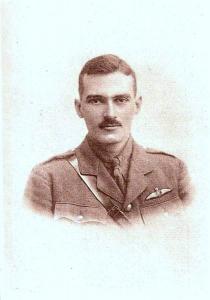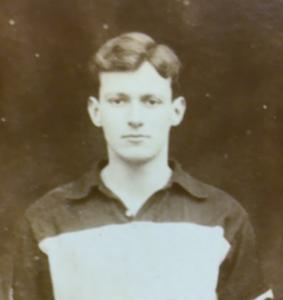
|

|
| Major Evelyn Paget GRAVES | |
|
25th Battery, Royal Field Artillery and 60 Squadron Royal Flying Corps Date of birth: 5th June 1890 Date of death: 6th March 1917 Killed in action aged 26 Buried at Avesnes-le- Comte Communal Extension Plot I Row C Grave 10 |

|
| Evelyn Paget Graves was born at Pachmarhi in India on the 5th of June 1890 the eldest son of Major the Hon Adolphus Edward Paget Graves, a traffic manager in Bombay, and his second wife, Katherine Louisa (nee Ward) Graves of "The Headlands", Downton, Salisbury in Wiltshire and of 6 St Georges Court London SW7. He was christened at All Saints Church, Nagpur on the 23rd of July 1890. He was educated at The Wick in Brighton where he was Head Boy, and at Lancing College where he was in Heads House from January 1905, in Olds House from 1906 where he was Head of House until he left in July 1908. He was a Prefect in 1907, in the Football XI in 1907 and 1908 and was a Colour Sergeant in the Officer Training Corps. On leaving school he completed his education with a private tutor, Mr A.V.H. Adams Esq. of Dreisner Strasse, Freiburg in Germany from August 1908 before returning to England to join the army. He applied for entry to the Royal Military Academy Woolwich in 1909 while he was living at "Pachmarhi", Copley Avenue in Reading. He was successful in his application and, on passing out, he was commissioned as a 2nd Lieutenant in the Royal Artillery on the 23rd of December 1910 and was promoted to Lieutenant on the 23rd of December 1913. He served in India for four years with the 25th Battery, Royal Field Artillery before returning to England shortly before the outbreak of war. On his return he joined the Royal Flying Corps and began flying lessons in July 1914, passing his Aero Certificate (No. 870) on the 18th of August 1914 at the Central Flying School at Upavon flying a Maurice Farman Biplane and gained his wings on his graduation from the Central Flying School on the 3rd of October 1914, entering the Royal Flying Corps as a Flying Officer the following day. On the 4th of February 1915 he met with a severe accident, crashing from some 700 feet while flying a Gnome Martinsyde scout at Netheravon in which he broke his right arm and suffered a compound fracture of his left leg which left him permanently lame. He described the fall as "not really disagreeable" but that he felt as if he was "going to walk out of one room into another". He spent a long period in hospital as a result of his injuries. On the 5th of June 1915 he was posted to 11 Squadron as their Squadron Commander, joining them at their base at Netheravon on the 7th of June. The squadron moved to France in July 1915 being the first scout squadron in the RFC. They were based at St Omer. Evelyn Graves was hospitalised on the 20th of July and was evacuated to King Edward's Hospital. On the 30th of July he was again posted to Netheravon where he joined 8 Reserve Air Squadron. He was promoted to Staff Captain on the 7th of September 1915 and served in that capacity on the staff of Brigadier General Higgins at 2nd Brigade. He returned to flying in December 1915, was promoted to Flight Commander on the 17th of December and was posted to 20 Squadron on the 28th of December. He flew back to France to join them on the 23rd of January 1916. On the 11th of May 1916 he returned to the Home Establishment. He was promoted to Squadron Commander on the 1st of July 1916 which was antedated to the 1st of June and to Temporary Major on the same day. He was then posted to 19 Reserve Squadron which was based at Hounslow. On the 2nd of October he moved with them to Hythe. While he was there he met with another accident on the 21st of November 1916 in which he injured his right leg and was sent home to recuperate. He was posted to France as Commanding Officer of 60 Squadron on the 18th of December 1916, returning there on the 22nd and joining his new squadron in the field on Christmas Eve. On the 6th of March 1917 he was leading a patrol of three other Nieuport fighters when he saw a FE2b of another squadron being attacked by eight enemy Albatross aircraft of Jasta 1 over Beaumetz near Arras. He led his patrol into the attack. During the engagement his aircraft was hit and caught fire and crashed at about 13.50 hours to the north of Riviere and about a mile to the west of the village of Wailly. The victory was claimed by Offizierstellvertreter Wilhelm Cymera of Jasta 1 who claimed to have shot down a British single seater at Agny, which is just to the north of Riviere at around the time of Graves' aircraft coming down. This was the second of the five victories claimed by Cymera before he himself was killed in action on the 9th of May 1917. It was found that Evelyn Graves had been killed instantly having been shot through the eye. His father received the following telegram dated the 11th of March 1917: - "Regret to inform you that Major E.P. Graves RFC was missing March sixth. This does not necessarily mean killed or wounded." His father received a further telegram dated the 15th of March 1917: - "Deeply regret to inform you that Major E.P. Graves RFA attached RFC 60 Squadron is reported missing March sixth is now reported killed in action. the Army Council express their sympathy." Brigadier General Higgins wrote:- “I feel I must write and tell you how sorry I am about your son's death. He has served with me off and on for about two years, and, as well as having to deplore the loss of a most gallant and capable squadron commander, I also feel I have lost a much valued personal friend. Your boy was one of the very best of the many fine officers I have known in the Corps. He was absolutely fearless, and was liked by everyone, whether serving under him or not, and is a real loss to the R.F.C..” His Wing Commander, Colonel Pretyman, wrote:- "He was brought down in a fight with hostile aircraft, and the machine fell on this side of the lines. Eye witnesses state that his action was one of the most gallant they had witnessed. He was leading one of his patrols, and engaged at least six enemy machines, who were attacking another of our machines. It will be some consolation to you to know that he was killed instantaneously by a bullet through his head, and therefore can have known nothing of the machine falling afterwards. To us this means a great deal, and it is with a great measure of relief that I heard he could not possibly have suffered at all. He was dead keen to imbue his pilots with all the keenness and dash they need for their work, and up to the time of his death he was certainly successful. They were all very fond of him, and he was of course an excellent squadron commander. Although the squadron are hard hit by the loss of their C.O., the influence of his personality and work will be felt for a long-time to come.” A brother officer wrote:- “He died as he lived trying to help someone else who was in trouble.” One of his Sergeants wrote:- “You simply had to work for the Major, because you felt you couldn’t let him down”. The Lancing Magazine of April 1917 wrote:- "He was in a famous squadron. Other Old Lancing Boys too young to know him at school had met him out in France, and brought back the report of his extraordinary charm. We have lost a man of great gentleness combined with energy, a man of spirited affection and devoted to duty, a man wonderfully humble and generous and satisfactory as a soldier and a friend". He was mentioned in Field Marshall Haig’s despatches for gallant conduct in the field. His father applied for his medals in July 1921. He is commemorated on the war memorial at Downton in Wiltshire. |
|
 | |
| Olds House |
Back